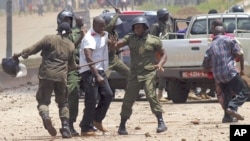Opposition party members and government supporters clashed on the streets of Guinea’s capital, Conakry, Thursday, during an opposition march calling for electoral reform.
The conflicts broke out as members of several opposition groups made their way along the protest route.
President Alpha Conde’s supporters “were throwing stones, coming at them with whatever they had,” said the co-founder of Alliance Guinea, Jennifer Swift-Morgan.
She added her sources in Conakry confirmed there were also clashes with security forces. “Our understanding is that there were both some police that were trying to facilitate the march, and also those that were beating people back with batons as well.”
The protests were organized to call for an audit of voter polls and for changes to the country’s electoral commission, known as CENI, ahead of long-delayed legislative elections.
Last month President Conde announced he was yet again postponing the legislative elections, which had been set for July 8. The votes were originally supposed to be held shortly after Conde’s election-win in November 2010.
Swift-Morgan said opposition members are frustrated with the continued delays. But she said they are equally frustrated with what they say is strong bias in the supposedly independent election commission and problems with voter registration.
“The opposition party members themselves were talking about not supporting the July 8 date that Conde just announced had been changed,” she said. “Really what they’re protesting against is the conditions under which the elections were to be held.”
Conde changed the July 8 date so that officials could have more time to sort out the alleged voter registration problems.
For now, Swift-Morgan said the country is controlled almost solely by the executive office. “From Alliance Guinea’s perspective, it’s an absolute travesty of democracy in Guinea,” she said. “The historical presidential elections that were held in 2010 were but the first step in what was supposed to be an entire transition process to get Guinea from military rule to a full-fledged civilian-led democracy, and that transition has not essentially happened.”
President Conde was elected in 2010, during Guinea's first free and fair presidential election since independence in 1958.
The conflicts broke out as members of several opposition groups made their way along the protest route.
President Alpha Conde’s supporters “were throwing stones, coming at them with whatever they had,” said the co-founder of Alliance Guinea, Jennifer Swift-Morgan.
She added her sources in Conakry confirmed there were also clashes with security forces. “Our understanding is that there were both some police that were trying to facilitate the march, and also those that were beating people back with batons as well.”
The protests were organized to call for an audit of voter polls and for changes to the country’s electoral commission, known as CENI, ahead of long-delayed legislative elections.
Last month President Conde announced he was yet again postponing the legislative elections, which had been set for July 8. The votes were originally supposed to be held shortly after Conde’s election-win in November 2010.
“From Alliance Guinea’s perspective, it’s an absolute travesty of democracy in Guinea.”Alliance Guinea's Jennifer Swift-Morgan.
Swift-Morgan said opposition members are frustrated with the continued delays. But she said they are equally frustrated with what they say is strong bias in the supposedly independent election commission and problems with voter registration.
“The opposition party members themselves were talking about not supporting the July 8 date that Conde just announced had been changed,” she said. “Really what they’re protesting against is the conditions under which the elections were to be held.”
Conde changed the July 8 date so that officials could have more time to sort out the alleged voter registration problems.
For now, Swift-Morgan said the country is controlled almost solely by the executive office. “From Alliance Guinea’s perspective, it’s an absolute travesty of democracy in Guinea,” she said. “The historical presidential elections that were held in 2010 were but the first step in what was supposed to be an entire transition process to get Guinea from military rule to a full-fledged civilian-led democracy, and that transition has not essentially happened.”
President Conde was elected in 2010, during Guinea's first free and fair presidential election since independence in 1958.





